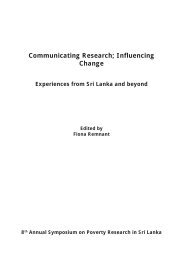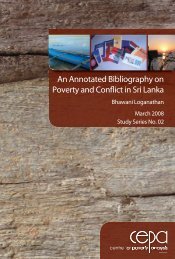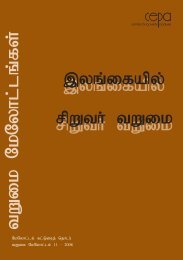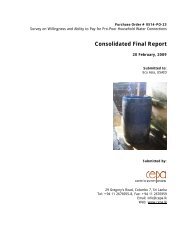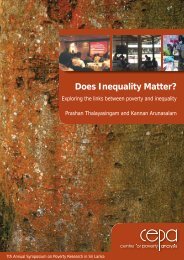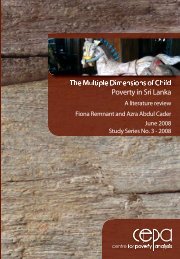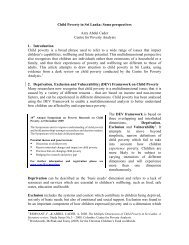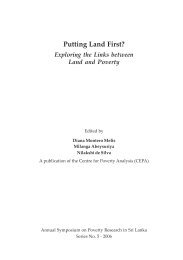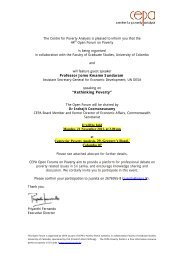Involuntary Displacement and Resettlement â Policy and ... - CEPA
Involuntary Displacement and Resettlement â Policy and ... - CEPA
Involuntary Displacement and Resettlement â Policy and ... - CEPA
- No tags were found...
Create successful ePaper yourself
Turn your PDF publications into a flip-book with our unique Google optimized e-Paper software.
<strong>Displacement</strong> <strong>and</strong> Livelihoods: A Case Study fromSri LankaRajith W.D. Lakshman 12<strong>and</strong> Kopalapillai AmirthalingamAbstractThis paper investigates how the livelihoods of internally displaced persons(IDPs) from Sampur, currently living in Batticaloa, Sri Lanka, were affectedby the displacement. In August 2007 <strong>and</strong> April 2008, we conducted extensivefieldwork in numerous welfare centers in Batticaloa which had receivedpersons displaced from the Mutur divisional secretariat (DS) in theTrincomalee district. A sample of 76 households from the village of Sampurwas selected for this purpose. Those who were displaced from Sampur areof Tamil origin. The results reveal that displacement has had a statisticallysignificant negative impact on livelihoods. However, the impact varies amongthe four categories of IDPs: Type I Labour, Type II Labour, GovernmentServants <strong>and</strong> Asset Holders. Type I Labour − who have a ready dem<strong>and</strong> inthe host community − <strong>and</strong> Government Servants are able to make endsmeet while Asset Holders are much worse off. Type II Labour has much lessdem<strong>and</strong> in the host communities <strong>and</strong> this has impoverished the Type IIlabourers in spite of their skills. Though Government Servants’ livelihoodswere economically intact, our results show that displacement has had otherforms of negative impacts on their livelihoods.1Dr. Kopalapillai Amirthalingam is a Senior Lecturer of the Department of Economics,University of Colombo. He has a M.Phil from the Jawaharlal Nehru University, New Delhi <strong>and</strong> iscurrently reading for his PhD at the University of Colombo, on indirect taxation in Sri Lanka. Hismore recent work has been on Sri Lankan economy <strong>and</strong> Internally Displaced Persons (IDPs). Hehas several international <strong>and</strong> local publications on IDP issues in Sri Lanka.2Dr. Rajith W.D. Lakshman is a Senior Lecturer of the Department of Economics, Universityof Colombo. He has also worked as a deputy director at the Secretariat for the Coordination ofthe Peace Process (SCOPP). He received his PhD from the University of Melbourne, Australia.Though his doctoral work concerned international financial markets <strong>and</strong> their inter-linkages, hismore recent work has been on economic analysis of Internally Displaced Persons (IDPs). He hasseveral international <strong>and</strong> local publications to his credit, many on IDP issues in Sri Lanka.57



